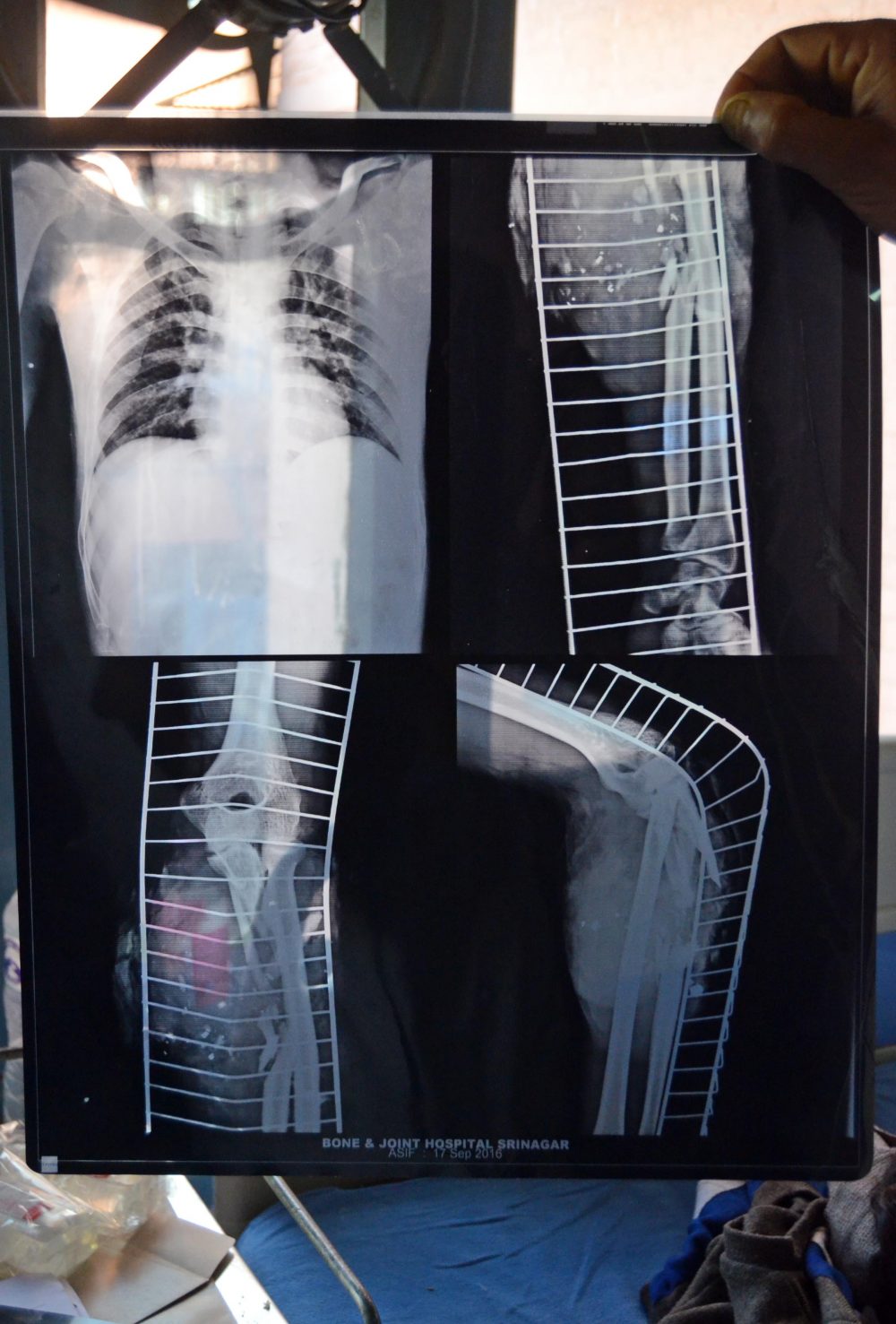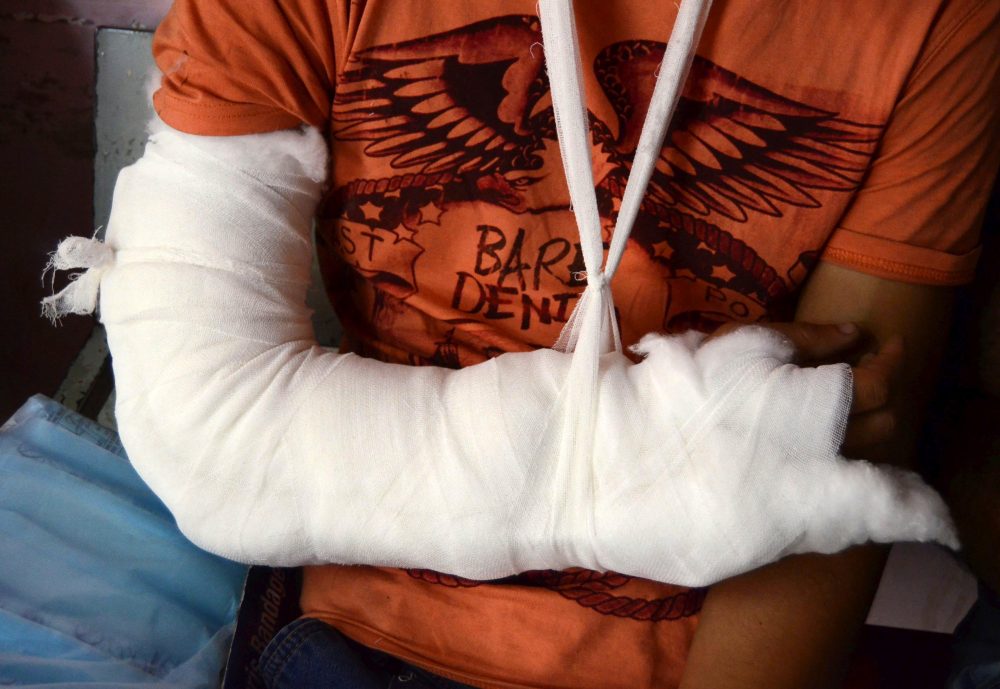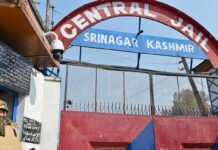In the Barzalla hospital, Shams Irfan meets two persons whose stories are gorier than people with similar injuries surrounding them

Lying on a hurriedly-placed bed, at the entrance of the emergency ward, Rashid, 45, is trying his best to keep his heavily bandaged right arm still and upright. “My son is admitted upstairs. His arm was fractured too,” said Rashid, before he talks about the incident.
On September 18, 2016, Rashid and his son Abid, a Class 12 student at a private college in Srinagar, were sitting at their home, located near 18 Rashtriya Rifles camp in Panzgam village of Kupwara, when they heard commotion outside.
“I saw people assemble near a telecom tower in hundreds and shout slogans against India,” recalls Rashid.
When enquired, Rashid was told by locals that army had taken down ‘the flag’ from the tower. “Around a month back some boys had hoisted a green flag on top of the tower. Since then it was there,” said Rashid. “Its removal by the army has irked locals.”
As crowd started to swell around the tower, army vehicles came back and tried to chase people away, resulting in intense clashes. “They (army) used force to break the protestors,” said Rashid.
Rashid, a contractor by profession, ran fast and managed to reach home. “They (army) then smashed everything that came into their way. They beat up everyone with sticks and guns,” said Rashid.
Before Rashid could have settled himself and caught his breath, there was loud banging on the front door; it was army men trying to break in. “When they failed, they attacked the grocery shop located on the ground floor,” said Rashid. “They looted everything that they could carry, and destroyed rest.”
After the army left, Rashid and his youngest son Abid, 16, went out to check the damage. “They (army) had damaged my three trucks which were parked in a vacant land nearby,” said Rashid.
Silently, the father son duo, along with one of their drivers began cleaning the shattered glass from the trucks. “I wanted to move them to a safer location quickly,” said Rashid.
But, to their surprise, the army party, whom they thought have gone back to their camp after the rampage, came back and charged towards Rashid and his son and driver. “They were carrying huge axes, sticks, and hammers,” said Rashid.
What happened next still frightens Rashid and his son. “They attacked my trucks with axes and hammers, damaging them beyond repair,” said Rashid. “Then they caught my son, me and our driver and beat us up like animals.”
A few blows landed on Rashid’s right arm, breaking his forearm bone, smashing it into small pieces, that doctors have now stitched together using iron clips. “Same is the condition of my son,” said Rashid.
After damaging the trucks completely, a soldier, said Rashid, aimed his axe at the fuel tank and perforated it with repeated heavy blows. “There was diesel everywhere,” said Rashid. “Then the army man asked his colleague for a matchbox so that he can set the vehicle on fire.”
To Rashid’s relief, about same time, a local police officer reached there with his men and acted as buffer between “out-of-control army men” and them. “He helped us sneak out and also stopped the army men from setting my vehicles on fire,” said Rashid.
Fearing a second attack by the army, Rashid, along with his son, went straight to a friend’s house, and spent rest of the day there. “The madness last for three hours till 6 pm,” said Rashid. “I didn’t visit the nearby hospital as I was told army has stormed it too.”
Instead, Rashid used two small sticks as splint material to keep his broken arm straight. The sticks were held tight with a piece of cloth. Then, with the help of his friend, he repeated the process for his injured son, whose right arm was fractured.
However, despite this quick fix, the night proved long and painful for Rashid and his son as they planned to visit B&J hospital in Srinagar, some 100 kms away, the next morning. “That night none of us could sleep. The pain was unbearable,” said Rashid.
Next morning, Rashid drove his injured son and his driver all the way to Srinagar, using his left hand. “You can say I am a strong man,” said Rashid with a smile when asked how he managed to drive 100 kms with one hand.
While Rashid and his son are treated at B&J hospital, their driver is referred to SMHS hospital, as he collapsed several time on way to Srinagar. “They beat him ruthlessly,” said Rashid, who insisted that his name is not used in the story. “My eldest son studies outside Kashmir. They (army) might harm him there.”

On the first floor, inside a small in-patient ward that smells of iodine, blood and sweat, Ghulam Mohiddin Kuchay, 37, a father of four, is lying on a bed, placed against a large window; his heavily bandaged left arm raised in air, supported by an iron bar.
On the either side of the bed, sit his wife, and his younger brother Qasim – a labourer by profession, who wears an angry face.
Kuchay, a contractual employee with state run Power Development Corporation, squeezes into a corner of the bed as he recalls the moment he was hit by a bullet. “I thought it was a rock,” said Kuchay. “But when I opened my eyes I was here (in hospital).”
On September 17, Kuchay, a resident of Chakpora village in Ganderbal district, was on his way to office when he heard fierce sloganeering. The slogans were raised in the nearby Shekhpora locality. The next thing Kuchay remembers was police, CRPF and STF men charging towards him. “I felt numb in my legs,” said Kuchay. “Then I ran towards my house as fast as I could.”
Later, Kuchay realised, he was not fast enough to beat a bullet, fired directly at him by the chasing men-in-uniform. “It didn’t hurt at first,” said Kuchay, looking at his arm with sense of self-pity.
Kuchay had already collapsed when his younger brother Qasim rushed out to help him. “He was surrounded by two dozen policemen and CRPF men who watched him bleed,” said Kuchay’s brother. “Instead of letting me help my brother they beat me up too,” he said showing his back that bore fresh marks of beating.
For next 30 minutes Qasim was not allowed to help his brother, who was bleeding badly. “Then I saw an ambulance coming towards me. It was carrying a patient. I waved and it stopped. But policemen chased it away, kicked it, attacked it with sticks,” said Qasim. “They wanted my brother to bleed to death. I was helpless.”
In the meanwhile, a few other young men from Kuchay’s neighbourhood tried to come near and help the brothers, but were chased and beaten too. “After ten minutes another ambulance came. It too stopped. The driver got down to help. But once again policemen stopped him. They threatened him too,” said Qasim, raising his voice inside the ward to let people around him know how he saved his brother. “But this time I stood up and dared the policemen to shoot me too,” he said. “I am taking him to the hospital. You want to shoot, go ahead. I won’t stop.”
Then without looking at the cops, the ambulance driver helped Qasim carry his brother inside the vehicle. The first stop was Kangan hospital. There doctors dressed his wound and referred him to B&J hospital Srinagar.
“It took us four hours to reach here (B&J hospital),” said Qasim. “See how much blood he had lost,” he said, holding his brother’s blood soaked shirt in air for everyone to see.
The doctors at B&J hospital told Qasim that it’s a miracle his brother survived despite losing so much blood. “We have already administered three pints of blood. He might need a few more,” said the doctor.
Qasim alleged that the local police officer takes pleasure in inflicting pain on civilians. “Otherwise how could anybody stop a dying person from reaching hospital,” he asks, and looks around as people nod in agreement.
Kuchay, who listened patiently while his brother narrated his journey to the hospital, concluded saying, “I would never go near a protest fearing I might be beaten or hurt. I was always afraid. But this bullet has taken out all my fears.”















